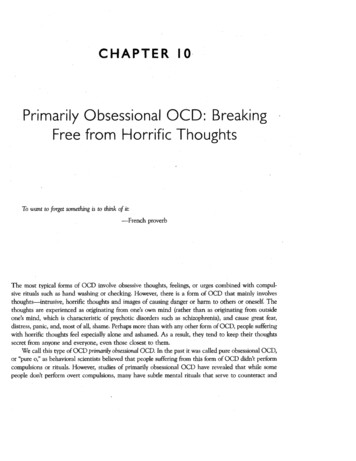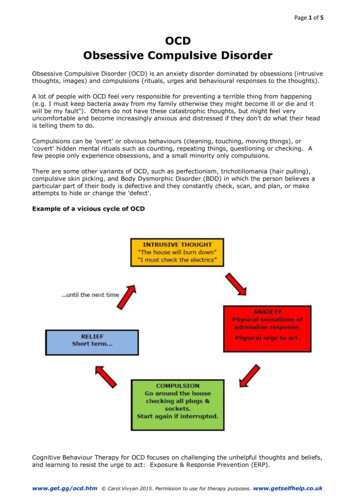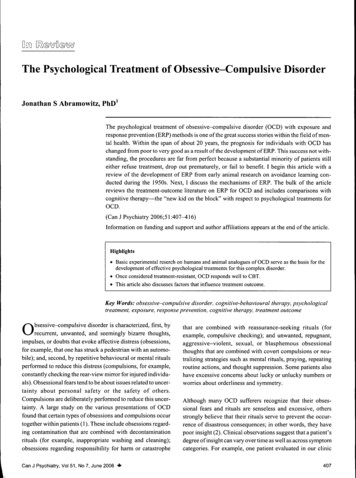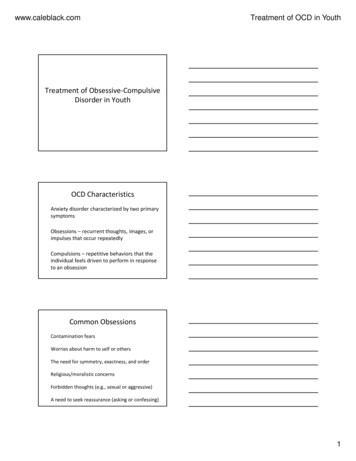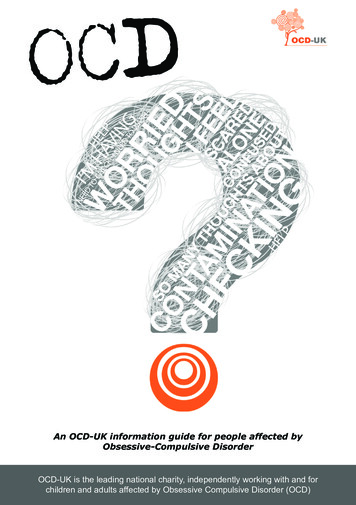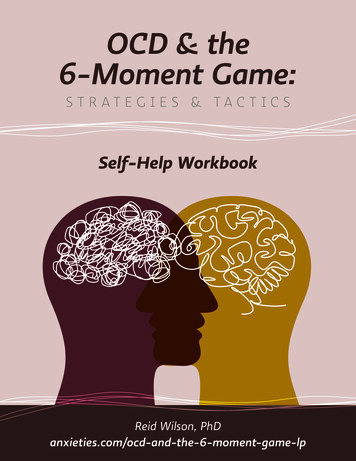
Transcription
OCD & the6-Moment Game:S TR ATEGIES & TAC T ICSSelf-Help WorkbookReid Wilson, PhDanxieties.com/ocd-and-the-6-moment-game-lp
OCD & the 6-Moment Game WorkbookThis workbook is part of the online self-help courseOCD & the 6-Moment Game:Strategies & TacticsWant to take a look at the course? pyright 2022 Reid Wilson, PhDPublished by anxieties.comCover & interior design by Red Nebula Inc.REID WILSON, PhD ANXIETIES.COMPAGE 2
OCD & the 6-Moment Game WorkbookTable of ContentsThe Learning Quiz. 4 OCD’s Strategy of Domination Our 6-Moment Game Power Tactics That Push You Forward Tactics that Mess with the Pattern The Kind of Practice That Helps You WinReady to Practice Our 6-Moment Game?.12Learning from the Course. 24 You Have a Challenger Our Game is Played in 6 Moments 4 Power Tactics That Push You ForwardCopies of Preparing forMoment-by-Moment Practice Form.38REID WILSON, PhD ANXIETIES.COMPAGE 3
OCD & the 6-Moment Game WorkbookThe Learning QuizLet’s see what you remember.OCD’s Strategy of Domination1. What seems to be Eric’s greatest concern regarding Sonya?A. She hasn’t finished preparing the children’s breakfast.B. Her OCD is getting worse.C. She hasn’t packed the children’s lunches.D. She won’t have the children ready to leave for school on time.2. How is OCD represented in the graphic?A. a snake in the grassB. your worst enemyC. a pickpocketD. here to teach you a lesson3. I spoke about perceiving this work as though it’s a game that you can win. OCD entersthis game dressed as:A. a master of disguisesB. the game officialC. a combination of the Hulk and Spider-ManD. the world champion4. What makes OCD so cunning?A. It takes advantage of our basic human nature.B. It knows the passcode to all your apps.C. It has discovered all your weaknesses.D. It’s quicker and more agile than you are.REID WILSON, PhD ANXIETIES.COMPAGE 4
OCD & the 6-Moment Game Workbook5. Why is Lee Ann upset with Conrad?A. He ruined their breakfast.B. He doesn’t want to check out the venue with her.C. He’s never introduced her to his parents.D. He continues to have doubts about their relationship.E. All of the above6. Libby can’t get out the door until she completes her checking rituals. What did she needto check today before she could leave for her job interview? (Circle all that apply.)A. the stoveB. the contents of her bagC. the ironD. the kitchen faucetE. the front door7. Sometimes OCD will stop bothering you about one theme and then generate obsessionsaround a brand-new theme. Why does it do that? (Circle all that apply.)A. Because OCD doesn’t care AT ALL about any of these themes.B. I mean it. The disorder has zero interest in your theme. Zero!C. It just wants to grab your attention and hold onto it.D. It develops amnesia and can’t remember what theme it was manipulating you with.REID WILSON, PhD ANXIETIES.COMPAGE 5
OCD & the 6-Moment Game WorkbookOur 6-Moment Game8. OCD is a parasite. It depends on you. It needs you. It lives off your responses. Itmaintains its strength ONLY by your responses. It’s nourished – it’s fed – by the way yourespond to it. OCD needs four big responses from you. Which one of these is not what itneeds from you?A. It needs you to take its messages seriously.B. It needs you to focus on the specifics of your theme.C. It needs you to tuck it in bed at night.D. It needs you to become intimidated.E. It needs you to respond urgently.9. I’ve been pretty emphatic around this topic, and I talked about it for long time here.What is it that I declared you should treat as “Nothing NOTHING!”?A. the things you value in lifeB. the theme of your obsessionC. your resistanceD. worries that are signals10. What is Conrad’s first new tactic against his obsessions?A. He raps to them.B. He dismisses them and returns to his studies.C. He puts his headset on and listens to music.D. He concentrates on making a peanut butter and jelly sandwich.11. OCD’s intention is to present itself as an authoritative figure who can influence you anddominate you. What all-knowing, all-powerful figure does OCD disguise itself as?A. Harry the HippoB. The Wizard of OzC. ZeusD. YodaREID WILSON, PhD ANXIETIES.COMPAGE 6
OCD & the 6-Moment Game Workbook12. In Sonya’s first big practice, she tries a new tactic. What is it?A. She asks Eric to stop checking the doors and windows before they go to bedeach night.B. She allows the kids to come home from the playground without immediatelywashing their hands.C. She creates rules for how she’s going to prepare lunch.D. She places a knife on her nightstand before going to bed.13. Moment 4 is a GIANT paradoxical move. Which of these is not part of that move?A. You break into a system that has been closed to you.B. You assert your conscious awareness into a 100% unconscious process.C. You win the moment without taking any action.D. Your obsessions instantly dissolve away.E. You create choice where there was no choice.F. In the face of a strong message of threat, you decide not to treat it as a threat.Message to Amygdala:“I’m safe.”Moment 4“I’m obsessingagain.”SomearousalREID WILSON, PhD ANXIETIES.COMAmygdala responds:“Hmm, whatdo I do?”PAGE 7
OCD & the 6-Moment Game Workbook14. As I described, in Moment 4, the amygdala will end up feeling confused. Which of theseis not part of that explanation?A. You’ve been telling it again and again that this is threatening. Now all of a suddenyou’re saying it’s not a threat.B. It’s built to protect you. It’s going to continue to err on the side of caution. It doesn’t yetunderstand that you’re safe.C. You’re trying to override a message that has been programmed into the unconscious.You’ll have to repeat this process many times in order to retrain it.D. Even though you’re applying the proper strategy, you’re going to continue to stay anxiousand uncomfortable. I want you to expect that and stick with the plan anyway.E. Your body and your unconscious mind both know that this is a threatening situation.They will always reject any attempt to control their responses. They don’t know why you’remaking an effort to influence them.15. Ideally, what should you no longer experience in Moment 5?A. paying attention to your obsessionB. your urge to engage in your compulsionC. your continued feelings of doubt and uncertaintyD. your distressing anxiety16. In Moment 6, which of the below interventions is best to use with any of thesestatements: “I don’t know whether I dropped something back there.” “I’m not certainif I’m a pedophile.” “I’m not convinced that I locked the door.” “I’m unsure about thedetails of that conversation.”A. Remind yourself that you do know and that you are certain.B. Don’t allow those thoughts to pop up anymore.C. Remind yourself that lots of people have these types of thoughts.D. Drop the prepositional phrase.REID WILSON, PhD ANXIETIES.COMPAGE 8
OCD & the 6-Moment Game Workbook17. So, you applied our strategies, maybe a tactic or two, and you handled that obsessivemoment or that urge to ritualize. However, within eight seconds, the obsession pops rightback up again. How should you respond?A. Want it!B. Freak out!C. You should feel disappointed in the strategies and discouraged about applying themin the future.D. You should get angry at yourself for not being stronger.Power Tactics That Push You Forward18. Treating OCD is never, ever, ever about your theme. This work has NOTHING to do withyour theme, your topic, your content. NOTHING! Your theme is completely, totally,absolutely irrelevant to the treatment. With this in mind, what do our characters need totreat as nothing?A. Libby needs to treat her fear of locking the door as NOTHING.B. Sonya needs to treat her fears about her girls as NOTHING.C. Conrad needs to treat that momentary flash of doubt about his relationship as NOTHING.D. All of the above19. What was the most powerful action that Sonya took to aggress on OCD?A. She used the same bath towel three days in a row.B. Instead of preparing her girls’ lunchboxes, she allowed them to purchase their lunches at theschool cafeteria.C. She purposely rubbed her hands over the kitchen counter and in the sink.D. All of the aboveREID WILSON, PhD ANXIETIES.COMPAGE 9
OCD & the 6-Moment Game WorkbookTactics That Mess with the Pattern20. Our goal is to modify your neurology. We need to change your mind. When you do thiswork, part of what you’re doing is the neurological process that we call “reconsolidation.”What simile did I use to describe the function of reconsolidation?A. It’s like your phone installing a software update.B. It’s like getting a haircut that trims what’s no longer needed.C. It’s like recycling to make new uses out of discarded vessels.D. It’s like putting a jigsaw puzzle back together.21. Out of her discouragement, Libby moved into creative determination regarding her ritualswith the car. What did she do?A. She drove back to the mall and then slowly drove through the parking lot as pedestrianswalked by.B. She returned to the neighborhood where she was having trouble, then moved her mirrorsso that she could not see behind her. Then she drove three times through the neighborhood.C. She washed the car again, but then only rinsed the car down one time.D. She opened all the doors and the trunk of her car and then closed them all and immediatelywent into the house.22. In her first big win, Sonya followed the rules she created for herself the day before. Asshe is preparing the kids’ lunches, she pulls the knives out of the drawer, opens the lids ofthe jars, spreads peanut butter and jelly on the bread slices, and puts the sandwiches intotheir lunch boxes. Then she goes to the sink and washes her hands thoroughly. Why wasthis a win?A. She messed with her compulsive pattern.B. Remember her compulsive pattern? She messed with it.C. She took OCD’s rigid pattern and messed with it.D. All of the above!REID WILSON, PhD ANXIETIES.COMPAGE 10
OCD & the 6-Moment Game WorkbookThe Kind of Practice That Helps You Win23. Three decades of research tells us the best way to develop skills and to develop themefficiently. What have they discovered? (Circle all that apply.)A. You don’t have to be gifted, have some natural talent, or have special genes passeddown to you.B. A good night’s sleep is mandatory.C. Your brain can grow and change in response to intense training. Everyone’s brainis adaptable. Yours, mine, everyone’s.D. You need to continually push yourself to go just outside your comfort zone, every singletime you practice. Create practices that make you feel a little awkward, clumsy, unsure.E. Your work is paradoxical. Want to do what you don’t want to do.F. Develop your verbal cues and use them before, during, and after you practice.G. All of the aboveAnswers to the quiz are on page 37 of this Workbook.REID WILSON, PhD ANXIETIES.COMPAGE 11
OCD & the 6-Moment Game WorkbookReady to Practice Our 6-Moment Game?If you feel motivated to start practicing your skills, then let’s go! If you want to take a little moretime to get oriented to the project before you start practicing – or if at any time you want toremind yourself of our game plan – then work on the “Learning from the Course” section on page24.Preparing for Moment-by-Moment PracticeHow do you plan a specific practice?When Libby didn’t make it to her car in those early practices – in those moments when she turnedback around to check the stove or the front door – the disorder wins those moments. But it didn’twin them all. Do you know why? Because as soon as she begins to walk down the sidewalk, shehas already gotten to Moment 5, because she turned her back on that urge to check. By the timeshe’s halfway down her sidewalk, she’s probably had several urges. But she keeps turning her backon her theme. She tells herself something like, “No, keep moving.” That means she won all thosemoments. These aren’t failures. These are good accomplishments.This is what you want to aim for: Win one Moment. Once you win that Moment, try to win thenext Moment, then another Moment. Your goal is to keep collecting those winning Moments.Obviously, you have to start with Moment 4. This is the very first task you should practice.Learn to mentally disengage long enough to name it. “There’s my obsession.” When you do that– when you assert your conscious awareness into that closed pattern – you’ve just modified thatpattern. And that’s already a win. You win that Moment. Even if nothing else changes, even if yougo back to obsessing again, you’ve just won that Moment. If you can only win Moment 4, then winREID WILSON, PhD ANXIETIES.COMPAGE 12
OCD & the 6-Moment Game WorkbookMoment 4. Keep winning Moment 4, but at the same time, try to create a way to get to Moment5. If you get to Moment 5 but can’t get to Moment 6, you’ve still won a Moment. Keep challengingyourself to get as far as you can get.Preparing for Moment-by-Moment PracticeWhere?When?How will you push outside your comfort zone?Any rules?Verbal cue for Moment 4:Verbal cue for Moment 5:Verbal cue for Moment 6:Verbal cue for motivation/determination:Do you want to talk to OCD? If so, say what?Do you want to mess with the pattern? If so, how?Do you want to try postponing? If so, what’s your plan?Do you need to add a consequence? What will you do?Here’s how you complete each of the items.Where?Is there a specific location or circumstance where you want to practice? Jot that down. If you wantto continually practice this in all circumstances, just write “everywhere.”When?Either put the specific day and time or simply write “continually.”REID WILSON, PhD ANXIETIES.COMPAGE 13
OCD & the 6-Moment Game WorkbookHow will you push outside your comfort zone?Decide how you want to generate that doubt and distress. [If you’re doing it by following newrules, that answer will be in the next line: Any rules?]Any rules?Decide whether it would be helpful to create rules to support your efforts. If so, then figure outthose guidelines before you begin and lock them down. By doing so, you won’t have to think aboutit anymore. You just follow the rules. [Don’t start creating rules when you’re in the middle of anobsession or having an urge to do a compulsion. Establish rules when you’re in the planning stage.]Do you remember how Conrad started to intervene in Moment 5? He decided that every time heheard an obsession pop up, he’d respond to it by rapping for a moment, and then he’d return to histask.Think about Sonya’s work. Her rituals involved washing and cleaning. Eventually, she needs todecide the acceptable times and ways to clean. Her current goal is to continue to move toward thatacceptable level. So she spent time creating rules that move her in that direction. Like Sonya, if youdon’t feel ready to give up your ritual, then what rules do you want to follow in this practice thatmove you closer to that standard? How do you want to modify your current ritual?Verbal Cue for Moment 4Create a short little message-to-self that will help you step back for a moment. Here are someexamples of what you might say. To make it easier on yourself in the future, put a checkmark nextto any of the messages below that you imagine might support your intention.Oh, I’m doing it again.There’s my obsession.There it is again.I’m obsessing.Others:REID WILSON, PhD ANXIETIES.COMPAGE 14
OCD & the 6-Moment Game WorkbookVerbal Cue for Moment 5If you can get to Moment 5, what might you say to yourself to help you turn away? Again, I’veprovided some examples below. Be sure to find messages that work for you. [I know that ourcharacters spoke their verbal cues aloud, but I suggest that you learn to subvocalize them.]Stepping away now.And I’m out of here.Wah-wah-wah.Nope, not going there.None of my business.Don’t figure it out.Leave the room now!Keep moving. Don’t stop.I’m turning my back on that.Others:Verbal Cue for Moment 6When Libby finally made it into her car and started driving away, she made it to Moment 6 severaltimes in a row. She kept instructing herself on the next action: Stop stalling, keep going. Keepmoving. Open the door. Get in the car. Start the car. Drive to the interview. (By the way, if you lookback on that practice, you’ll notice that Libby was also supporting herself and motivating herselfwith verbal cues: “You’re killing it!” “I’m taking my LIFE back.” “I can handle this.” We’re talkingabout them next.)That’s what we’re looking for in Moment 6. Give yourself instructions about what to do next. Andfollow those instructions! That’s how you win that moment. Here are a few examples for you. Youcan also add your own instructions that work for you.Now, where was I?Getting back to work now.REID WILSON, PhD ANXIETIES.COMPAGE 15
OCD & the 6-Moment Game WorkbookKeep moving. Keep moving.I guess it’s time to count those ants again.Others:Verbal Cue for Motivation/DeterminationDo you remember when Sonya caught herself breaking her own rule by washing her hands? Sheslammed her hands down on the counter and yelled, “I want my life back!” That’s a good exampleof how you can motivate yourself and feel determined. A few seconds later, she told herself, “Keepgoing!” As she continued to break OCD’s rules, she told herself, “You are strong, and you want this.”That’s what you’re looking for here.Geez, this is hard! But this is what I signed up for.I’m going to be scared and do it anyway.I can do this. I’m gonna stay with it.My job is to push forward.Keep moving, keep moving.I’m going to get stronger, whatever it takes.I’m going to take my faith back.I want to be available for my family.I want my life back!I want my mind back!This is exactly what I want right now.I want to do this hard work.I want to take OCD on.I want whatever scares me.I want this struggle right now.I want this doubt. I want to not know.I want this distress.REID WILSON, PhD ANXIETIES.COMPAGE 16
OCD & the 6-Moment Game WorkbookI’m working on wanting this.I’m willing to feel this.Others:Do you want to try talking directly to OCD? If so, what will you say?Nice try, OCD. But I’m not going there.I’m coming after you, OCD.Is that all you’ve got? Come on—give me your best shot.Hey, back off, OCD!You’re giving me this? Great! Just what I wanted.Bring it on, OCD!Others:Do you want to try postponing? If so, what’s your plan?[This is covered in the course.]Do you want to mess with the pattern? If so, how?Think of these as backup tactics. If you’re getting stuck, and having a hard time making progress,you can pull one of these out of your back pocket. They can help you get unstuck, and they canhelp you get stronger. In just a moment, we’ll go into detail about how to do this (see: How toMess with the Pattern).Do you need to add a consequence? What will you do?Think back on that scene when Libby decided to open every door of her car and her trunk. She wasadding a very small consequence to her ritual. In the section titled How to Add a Consequence (pg.22), we’ll discuss this tactic in greater detail.REID WILSON, PhD ANXIETIES.COMPAGE 17
OCD & the 6-Moment Game WorkbookHow to Mess with the PatternEvery step of the way, you should find tactics to mess with what OCD is giving you. Look for somesmall ways to be both uncertain and distressed. Some of these changes can make it just a bit moretroublesome to obsess or ritualize. These pesky little modifications help build your commitment toeventually end your obsessions and rituals. Expect that at some point you might actually think, “I’drather just not keep doing this right now if I have to do it THAT way!”In the course, I detailed two ways to mess with your obsessions, and Libby demonstrated the first: Sing your obsession Act as a stenographer (write your obsessions down)Your rituals may include a certain number of repetitions or a particular object, like bar soap versusliquid soap. Some rituals require that you’re always standing or sitting, while others must occur in acertain setting, like at your desk or in your car. All of these can be manipulated.Why change them up? The most important reason is to create some degree of doubt and distress.Each time you modify some component of your compulsion, you loosen OCD’s hold on you.However, making any change, even if it seems minor, will probably cause you some distress.The pattern will no longer match your previously exacting standards, and that will give youuncertainty and discomfort. Keep in mind that two of your tasks in this self-help program are toseek out uncertainty and seek out distress. So, while these changes will be difficult, they will becontributing to your goal of taking back control of your life.Be willing to experiment with minor revisions to your ritual, and learn to tolerate these smallchanges.Are you concerned that you might create a whole new ritual? That’s not going to happen. Becauseyour job is to keep changing it up until it no longer has a hold on you. Continue with a particular change for several days. In doing so, you’ll have time to discover yourREID WILSON, PhD ANXIETIES.COMPAGE 18
OCD & the 6-Moment Game Workbookgrowing skills in tolerating a modification to the ritual and in tolerating the discomfort you feelas you bring this ritual under voluntary control. As you gain mastery in this skill of manipulation, continue to modify your ritual pattern. Thenthink about adding postponing to your practice.Rituals can have any number of characteristics. They can all be modified. Here’s the list of what I’llcover below. Change the order in which you ritualize Change how you use your hands Add something to the ritual Reduce the time Change the objects you use Change words and tone of voice Change the location Alter the image Change your posture during the ritual Reduce the participation of othersHere are some ideas about what you might change. Remember that it doesn’t matter how smallthe change is. However, it is important that you create changes that you predict will cause yousome doubt and discomfort.Change the order in which you ritualizeFor instance, if you shower by first washing your hair and then methodically working your waydown to your feet, you can reverse the order by beginning with your feet.Do you have a set of rituals that you feel compelled to do before you go to bed? Must you firstcheck the front door, then the back door, then all windows, then the kitchen appliances all ina specified sequence? Change it up. For example, you can write each task down on a little pieceof paper and draw them out of a jar to decide the order in which you perform them.If you have to wash your hands to the count of ten, try washing them to the count of five.Then dry your hands off and wash them again for the second set of five.REID WILSON, PhD ANXIETIES.COMPAGE 19
OCD & the 6-Moment Game WorkbookAdd something to the ritualIf you must tap each arm three times, then tap each arm twice, clap once, and then tap eacharm a third time.If you check more than once that the doors are locked each night, then before each check do apirouette (a spin in place). I know: That’s ridiculous. Are you surprised?Must you pull on the emergency brake of your car four times? Decide to pull on it twice, thenwait 60 seconds before you pull on it the next two times.Can you wear sunglasses while you’re checking whether the windows are locked?Change the objects you useIf you always clean up with paper towels during your ritual, switch to cloth hand towels.If you wash with liquid soap, you could change to bar soap.If you use a bar of soap, can you cut it up into twelve pieces, use one piece each time youwash, and then throw that piece away?Change the locationIf you have to dress and undress repeatedly, you might do each set in a different room.If you wash your hands more than one time, try changing sinks each time you wash (thekitchen, the guest bathroom, etc.).Is it a ritual that you do indoors? Could you do it outside?If you do it in your office, could you choose to do it in your car instead?REID WILSON, PhD ANXIETIES.COMPAGE 20
OCD & the 6-Moment Game WorkbookChange your posture during the ritualCould you make yourself sit when you normally stand?If you always have your eyes open, can you try doing your compulsion with your eyes closed?One eye closed?Consider some silly change, like standing on one leg.If you can’t change the order of how you dress, could you make yourself get dressed while lyingon your bed?Change how you use your handsIf your hands are involved in your ritual, do you mainly use your dominant hand? Can youswitch to your nondominant hand?Do you clean a surface in clockwise circular motions with your right hand? Can you clean incounterclockwise square patterns with your left? Can you switch hands every ten seconds?Reduce the timeHow much time does each sequence of the ritual take? Reduce the time you take for each action.Can you create a time limit to complete a segment? Please remember: I’m not suggesting thatyou simply “go faster.” The purpose of making these changes is to feel some degree of doubt anddistress.If you force yourself to complete your ritual in an abbreviated manner, you’ll feel uncertainabout how well you did it.If you stop at your new designated time even if you haven’t completed your ritual, you’llcertainly make yourself feel distressed.REID WILSON, PhD ANXIETIES.COMPAGE 21
OCD & the 6-Moment Game WorkbookChange words and tone of voiceMust you repeat any specific words either silently or aloud? Can you change any of thosespecific words?Can you sing those same words in your mind?Can you modify your tone of voice (e.g. change a respectful tone to a silly tone)?Alter the imageDuring your ritual, must you purposely see some positive image? How might you change thatimage?Can you alter its appearance?Can you add purple stripes to the background?Can you change brown shoulder-length hair to short blonde hair?Can you change a color image to black-and-white?Reduce the participation of othersDo you ask others to participate in your ritual? Must they say or do something specific? Is there anyway to change the participation of others? Can you reduce or limit the behaviors of others?How to add a consequenceYou may have a ritual that is so “automatic,” so ingrained, that you can’t seem to catch it in time tochange it. One simple change that can greatly increase your awareness is to add a consequence –some additional task – every time it happens that way. Choose a task that requires you to disruptyour normal routine. And, most importantly, if you agree to add this task, then follow through100% of the time, because that’s how you’ll raise your awareness. For instance decide to drive to a park and pick up trash for an hourdo some kind gesture for someone you’re angry withpractice the piano for forty-five minutesREID WILSON, PhD ANXIETIES.COMPAGE 22
OCD & the 6-Moment Game Workbookhand-copy ten poems from a booktake a brisk 30-minute walkIf these sound like disruptive, time-consuming tasks, it’s because they’re intended to be! Yetdon’t perceive them as punishment. To be effective, the consequences must be costly in time andeffort. After paying that cost a number of times, you’ll start becoming aware of the moment thatyou’re about to ritualize, and you’ll hesitate. You’ll pause to think about whether it is best to startritualizing. This moment of hesitation gives you an opportunity to resist the compulsion in order toavoid that costly consequence.Think about Libby’s struggles with the stove. Let’s say you must ritualistically check the stove everytime you leave the house for work in the morning. You tend to get stuck touching each knob sixtimes before you walk out the door. Later, when you’re on the front porch, you doubt whether thestove is off, and back you go for another round of checking – “just to be sure.” This would be agood time to implement a consequence.Perhaps you decide that, starting tomorrow, each time you check the stove again, touch a knobwhile checking, or even glance at the knobs again while walking through the kitchen, you musttake a brisk thirty-minute walk as soon as you come home from work. You commit to taking a walkbefore doing anything else. No stopping at the store on the way home. No having a snack after youget home. You’ll just put on your walking shoes and go, regardless of whether it’s hot and muggy,raining, or snowing. After a few of these thirty-minute walks, you’ll be thinking twice beforestepping back inside from the porch – “just to be sure.”This tactic will work whether you’re a washer who wants to stop washing your hands a secondtime, a hoarder who wants to stop collecting meaningless materials, or an orderer who wants tostop straightening up repeatedly. Use your creative thinking, and enlist ideas from your family orfriends. Find consequences that cost you some time and effort, and then stick to them. If theconsequence you choose does not have this intended effect after numerous trials, then switch to aconsequence that seems a little more costly.REID WILSON, PhD ANXIETIES.COMPAGE 23
OCD & the 6-Moment Game WorkbookLearning from the CourseLet’s review to help you get ready.You Have a ChallengerI described OCD as a pickpocket. What do you think it might’ve stolen from you?Let’s recognize what your challenger is trying to accomplish, so you know what you’re up against.We know that it threatens you about at least one specific theme, and then it often triggersdistressing doubt regarding that theme. Take a moment to see how it might be doing that withyou.Do you have a sense of what your obsessive theme or themes are? List them in the left columnbelow. In the right column, jot down what kind of doubts it provokes regarding each theme. ToREID WILSON, PhD ANXIETIES.COMPAGE 24
OCD & the 6-Moment Game Workbookhelp you get started, I’ve listed some major
OCD h -Momen Gam Workbook REID WILSON, PhD ANXIETIES.COM PAGE 6 Our 6-Moment Game 8. OCD is a parasite. It depends on you. It needs you. It lives off your responses. It maintains its strength ONLY by your responses. It's nourished - it's fed - by the way you respond to it. OCD needs four big responses from you. Which one of these is .
